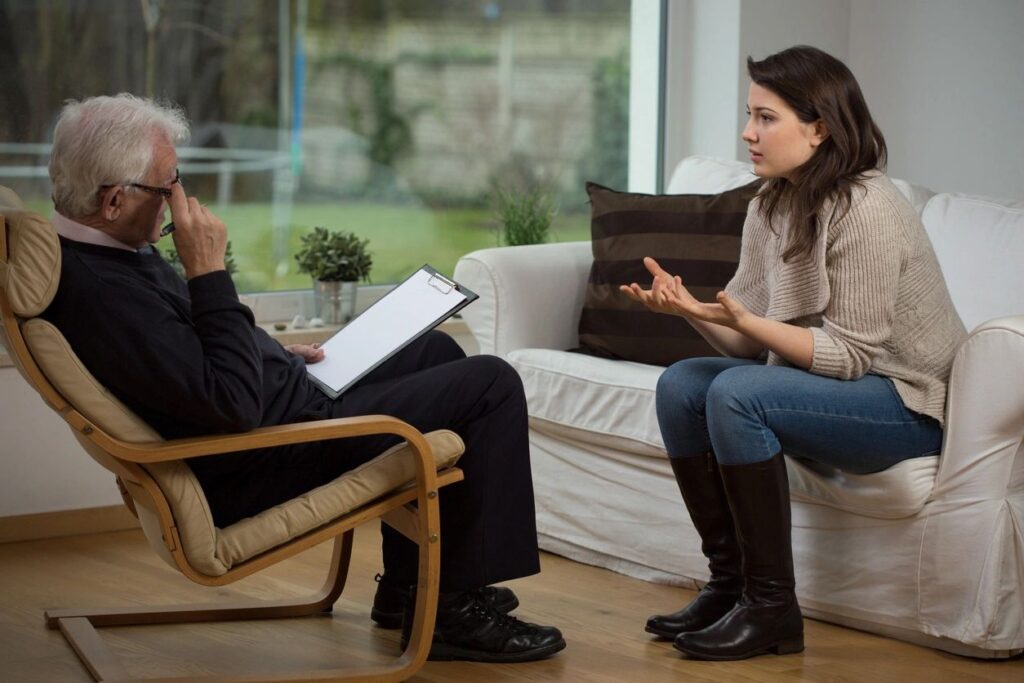Simply Thrive Therapy Blog

Thoughts – Emotions – Behaviors: A cheat sheet to making changes
Thoughts – Emotions – Behaviors: A cheat sheet to making changes People operate within some form of this basic interconnected cycle: we have a feeling/emotion, which triggers a thought/belief, which we act on (behavior). Or we take an action (behavior), like give someone a hug, which causes a feeling (warmth or safety or affection), which makes a thought pop into our heads (“I want to see this friend more often!” or “I’m so grateful for my mom!”), etc. You get the idea. This three-part cycle is the basis of pretty much everything we do. This means, if one of those parts becomes harmful, it can turn into what we all

Questions to Ask Your Potential Therapist
Questions to Ask Your Potential Therapist Congrats on taking the first step towards taking care of yourself and your mental well-being! Now that you’re ready to enter into therapy and start working on yourself, you have the opportunity to screen and select your therapist. This person will be your cheerleader, your guide, your supporter, your confidant. Not just any individual can fulfill this role for your journey, so as much as possible, take the time to vet this person and make sure they fit your needs. You’ll be investing time and energy into yourself, so I strongly suggest taking the time to understand who the professional is before you

Bisexuality Awareness Week
Bisexuality Awareness Week This week is Bisexual Awareness Week, also known as #BiWeek. This week is an annual celebration held in September, from the 16th through the 23rd. It is an extension of Celebrate Bisexuality Day, held annually on September 23. Bisexuality is a type of sexual orientation where individuals experience a sexual and/or romantic attraction to more than one gender. Bisexual people actually make up the largest population within the LGBTQIA+ community and about 3.9% of the adult population in the United States. How many times have you heard “it’s just a phase” or “they’re just being indecisive.” Well, these phrases may actually have a significant effect on bisexual individuals.

Strengths
Strengths We hear a lot about using our strengths, but the annoying truth is that we humans are usually better at focusing on our weaknesses (or, more often than not, what we think our weaknesses are) than we are at focusing on our strengths. So let’s break down this whole strengths thing into something that’s actually usable! First of all, we need to identify some strengths that we know we have, beyond any doubt! Here’s a link to one list, but it’s not hard to find all kinds of these lists: https://www.therapistaid.com/worksheets/strengths-list No matter how hard we are on ourselves, we usually have at least a couple that jump off

What is Positive Psychology? And isn’t it just “thinking positive?”
What is Positive Psychology? And isn’t it just “thinking positive?” No, certainly not! “Thinking positive” needs to have a realistic foundation to work. Otherwise, we would have all “thought” ourselves into utopia by now! Positive psychology is the practice of utilizing positive elements of the reality around us to provide us with a sense of well-being. Here’s a few basics you can use from positive psychology. If you like it, you can find plenty more where that came from, because it’s an entire field of its own with many dedicated practitioners. Gratitude: this can help refocus your mind from negative things to positive things. They’re both present – the trick

Benefits of Gardening for Your Mental Health
Benefits of Gardening for Your Mental Health Spending time outside is good for our bodies and our minds. If we are feeling stressed and overwhelmed, stepping outside can lift your spirits and mood significantly. Those that love to garden, know that spending time amongst the petals provides numerous mental health benefits such as reducing stress, becoming closer to nature and enjoying peaceful, alone time. Here are some of the benefits of gardening for our mental health. Promotes exercise Gardening is a great way to get exercise. When you exercise, your body releases endorphins into your brain. Endorphins are chemicals produced by your body to relieve stress and pain. Even though
